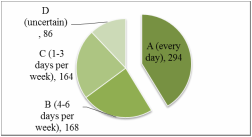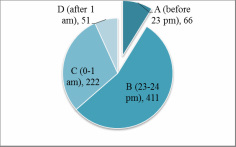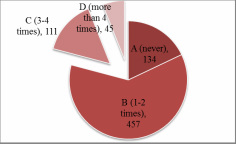RMB Should Not Be Fixed (April 19, 2012)
For the past few years, it has been a controversial issue whether China should continue a floating exchange rate or not. In fact, China has already started the well-supervisory floating rates system since July 21, 2005 which is based on supply and demand in the market and adjusted by a basket of currencies. What’s more, since April 16, 2012, China's central bank has widen the Yuan’s trading band to one percent above and below the daily dollar reference rate, a doubling of the current point 5 percent limit (“New”). Robert Mundell, known as “Father of the Euro” for his contributions to foreign exchange theory, always suggests that China should keep currency peg to the US dollar (“Mundell”). However, most prominent economists argue that RMB should not be fixed, and there are several reasons as follows.
Opponents of RMB’s floating exchange rate system argue that a change in the currency regime would bring “damaging” volatility to China, and harm domestic economic growth and employment (“Mundell”). They worry that the system would endanger the country's immature still-fragile financial system. However, PBOC (People’s Bank of China) proclaims on its website that China's current foreign exchange market is developing more maturely and trading entities are more capable of pricing independently and managing their risks (“Announcement”). Furthermore, it’s believed that RMB’s floating exchange rate system can facilitate the improvement of China’s financial system (Shao).
Opponents of RMB’s floating exchange rate system also contend that it could create a zero-interest liquidity trap in financial markets that leaves the central bank helpless to combat future deflation arising from actual currency appreciation (McKinnon). This standpoint is right only when there is little inflation. Nevertheless, with a high inflation rate these days, China is unlikely to fall into the zero-interest liquidity trap. Moreover, if the inflation rate remains high, China’s central bank cannot ease the inflationary pressure by appreciating RMB under the fixed exchange rate system. Therefore, it will be more beneficial to China’s economy if RMB is flexible rather than fixed.
The final argument advanced by opponents of RMB’s floating exchange rate system is that it may slow down the economic growth of China (Li). The reality, however, is that China’s GDP has maintained a very high growth rate during the past 30 years, even after China started the well-supervisory floating rates system in 2005. Last year, the growth rate of GDP in China was 9.2% (“2011 Statistics”). Thus, the system’s deceleration effect on China’s economic growth is insignificant. On the other hand, there are lots of arguments against China’s breakneck growth, which may be detrimental to China’s economy. Therefore, what we need now is appropriate moderation of economic growth rather than relentless pursuit of high growth rate. Thankfully, RMB’s fluctuation can be the moderator for China’s breakneck growth by bringing more restrictions from the international market, which can make China’s development much healthier.
It’s obvious that the arguments against RMB’s floating exchange rate system are not valid. On the contrary, RMB’s floating exchange rate system is suitable for China’s financial conditions, which can help improve China’s financial system; and it enables China’s central bank to ease the inflationary pressure by appreciating RMB; and it will also be beneficial to China’s healthier development. In a word, RMB should not be fixed.
Works Cited
“Announcement of PBOC (2012) No.4” PBC.gov.cn 14 April, 2012. 16 April, 2012
http://www.pbc.gov.cn/publish/goutongjiaoliu/524/2012/20120414090504815230140/20120414090504815230140_.html
Li, Yang, and Yu Weibin. “The Reform of RMB Exchange Rate System: Return to Managed Floating” Economic Research 20 Aug. 2005: 24-31.
McKinnon, Ronald. “China’s Exchange Rate Trap: Japan Redux?” American Economic Review 14 May 2006: 427-431
“Mundell: China Should Keep Currency Peg.” CHINADAILY.com.cn 3 June 2005. 16 Apr. 2012 http://www.chinadaily.com.cn/english/doc/2005-06/03/content_448457.htm
“New RMB-Dollar Trading Limit Comes into Effect on April 16th” ENGLISH.CNTV.cn 16 Apr. 2012. 16 Apr. 2012
http://english.cntv.cn/program/newshour/20120416/112378.shtml
Shao, Zhuhao. “Discussion of RMB’s Floatation” Contemporary Economics 14 Feb. 2008: 124-125.
“The 2011 Statistics Bulletin of the National Economic and Social Development of the People's Republic of China” STATS.gov.cn 22 Feb. 2012. National Bureau of Statistics of China. 16 Apr. 2012
http://www.stats.gov.cn/tjgb/ndtjgb/qgndtjgb/t20120222_402786440.htm
Opponents of RMB’s floating exchange rate system argue that a change in the currency regime would bring “damaging” volatility to China, and harm domestic economic growth and employment (“Mundell”). They worry that the system would endanger the country's immature still-fragile financial system. However, PBOC (People’s Bank of China) proclaims on its website that China's current foreign exchange market is developing more maturely and trading entities are more capable of pricing independently and managing their risks (“Announcement”). Furthermore, it’s believed that RMB’s floating exchange rate system can facilitate the improvement of China’s financial system (Shao).
Opponents of RMB’s floating exchange rate system also contend that it could create a zero-interest liquidity trap in financial markets that leaves the central bank helpless to combat future deflation arising from actual currency appreciation (McKinnon). This standpoint is right only when there is little inflation. Nevertheless, with a high inflation rate these days, China is unlikely to fall into the zero-interest liquidity trap. Moreover, if the inflation rate remains high, China’s central bank cannot ease the inflationary pressure by appreciating RMB under the fixed exchange rate system. Therefore, it will be more beneficial to China’s economy if RMB is flexible rather than fixed.
The final argument advanced by opponents of RMB’s floating exchange rate system is that it may slow down the economic growth of China (Li). The reality, however, is that China’s GDP has maintained a very high growth rate during the past 30 years, even after China started the well-supervisory floating rates system in 2005. Last year, the growth rate of GDP in China was 9.2% (“2011 Statistics”). Thus, the system’s deceleration effect on China’s economic growth is insignificant. On the other hand, there are lots of arguments against China’s breakneck growth, which may be detrimental to China’s economy. Therefore, what we need now is appropriate moderation of economic growth rather than relentless pursuit of high growth rate. Thankfully, RMB’s fluctuation can be the moderator for China’s breakneck growth by bringing more restrictions from the international market, which can make China’s development much healthier.
It’s obvious that the arguments against RMB’s floating exchange rate system are not valid. On the contrary, RMB’s floating exchange rate system is suitable for China’s financial conditions, which can help improve China’s financial system; and it enables China’s central bank to ease the inflationary pressure by appreciating RMB; and it will also be beneficial to China’s healthier development. In a word, RMB should not be fixed.
Works Cited
“Announcement of PBOC (2012) No.4” PBC.gov.cn 14 April, 2012. 16 April, 2012
http://www.pbc.gov.cn/publish/goutongjiaoliu/524/2012/20120414090504815230140/20120414090504815230140_.html
Li, Yang, and Yu Weibin. “The Reform of RMB Exchange Rate System: Return to Managed Floating” Economic Research 20 Aug. 2005: 24-31.
McKinnon, Ronald. “China’s Exchange Rate Trap: Japan Redux?” American Economic Review 14 May 2006: 427-431
“Mundell: China Should Keep Currency Peg.” CHINADAILY.com.cn 3 June 2005. 16 Apr. 2012 http://www.chinadaily.com.cn/english/doc/2005-06/03/content_448457.htm
“New RMB-Dollar Trading Limit Comes into Effect on April 16th” ENGLISH.CNTV.cn 16 Apr. 2012. 16 Apr. 2012
http://english.cntv.cn/program/newshour/20120416/112378.shtml
Shao, Zhuhao. “Discussion of RMB’s Floatation” Contemporary Economics 14 Feb. 2008: 124-125.
“The 2011 Statistics Bulletin of the National Economic and Social Development of the People's Republic of China” STATS.gov.cn 22 Feb. 2012. National Bureau of Statistics of China. 16 Apr. 2012
http://www.stats.gov.cn/tjgb/ndtjgb/qgndtjgb/t20120222_402786440.htm
Health Problems of Undergraduates at Peking University (May 26, 2012)
Being an undergraduate at Peking University (PKU), I personally find that many undergraduates around me don’t pay adequate attention to their health. They skip breakfast, sleep late, and do little physical exercise. In fact, I did a survey about the lifestyles of undergraduates at our university in October, 2011. The results show that 58.7% of undergraduates at PKU cannot ensure eating breakfast every day, 36.4% usually sleep after midnight, and, surprisingly, 79.1% do exercise no more than twice a week (Zhuang). Apparently, there are many problems in their lifestyles.

The first problem is skipping breakfast, which is really harmful for undergraduates at our university, taking into account the vital importance of breakfast. On the one hand, we are in the period of growth, and also under great pressure of studies; therefore, our nutrient requirements and energy needs for bodies are considerably huge. In particular, we need to do a mass of brainwork every day, which necessitates a constant supply of energy for our brains to function well. On the other hand, breakfast can offer more than 30% of our daily requirements for nutrients and energy, and, particularly, it plays an important role in supplying blood sugar for our brains (Li). If we skip breakfast, our blood sugar levels will be very low, so our brains will not obtain enough energy, resulting in low excitability of our brains, which will consequently make us drowsy and distractive. Therefore, breakfast is indispensable for undergraduates at PKU, but, according to my survey, more than half of them are unhealthy in terms of their eating habits, which might be caused by the next problem below.

The second problem is that many undergraduates at PKU usually sleep after midnight, some of whom may consequently get up late and thus skip breakfast. Besides, sleeping late per se is also unhealthy for undergraduates. According to my survey, most undergraduates at PKU usually sleep late because of their great pressure of studies, which, in effect, is a symptom of the psychological illness called “sleep-late obsession”. Sleeping late will probably cause forgetfulness and irritability, and thereby more mistakes in our study and work (Ji). In accordance with a theory of traditional Chinese medicine, our bodies have a “detoxification schedule”: liver detoxifies itself during 23 pm to 1 am, gall bladder 1 to 3 am, lung 3 to 5 am, and large intestine 5 to 7 am; sleeping late will have a bad impact on this schedule, so it is better for us to go to bed between 10 pm and 11 pm (Zi). In this way, my survey shows that 91.2% of undergraduates at PKU are unhealthy in terms of their sleeping habits.

The last but the most worrying problem is that undergraduates at PKU do exercise too little, and thereby their physical fitness is poor. According to the annual report of Peking University’s student health and physical strength assessment (2011), roughly 82.7% of undergraduates passed the exam, falling short of physical fitness target—85%, with 25.8% of boys falling to meet standards (“A Quarter”). Research also shows that undergraduates’ physical fitness still keeps declining, which is greatly attributed to the lack of physical evaluation (Zhang). Moreover, according to a study, there is an inverse relationship between the levels of students’ anxiety and the frequencies of their physical exercise (Hu et al. 62). Therefore, little exercise can not only lead to a lower physical fitness, but also bring more anxiety. If we keep doing exercise little, the increasing anxiety will reduce our study efficiency and weaken our bodies, which can blight our continuing study and eclipse our future. It is widely acknowledged that doing exercise every day is beneficial to our health, and it is suggested that we should do exercise at least 3 times a week. However, my survey shows that only 20.9% of undergraduates at PKU can meet this standard. In fact, most of them have been used to being preoccupied with their study since high school, some of them even considering exercise a waste of time. Obviously, undergraduates at PKU should pay more attention to their physical exercise.
Based on the above analysis, I must emphasize the fact that we undergraduates at PKU are facing a series of serious health problems: skipping breakfast, sleeping late, and doing physical exercise too little. To solve these problems and enable us to embrace a brighter future, I’d like to give some personal suggestions. First, we can store some packaged foods at our dormitories. If our time is not enough for a normal breakfast, we can take some to our classrooms or wherever else we are going to, so we can at least ensure eating things during breakfast time every day. Second, we can adjust our biological clocks by using alarm clocks. We can try to get up early by regularly setting an alarm clock (or several clocks if one is not enough), so we can have enough time for breakfast, and, consequently, we will feel sleepy and fall asleep at the right time in the evening. Last but not least, we can do exercise at our dormitories or classrooms. It seems ridiculous, but, actually, exercise can be done anywhere. For example, we can leave our desks every 50-60 minutes and stretch our bodies in the classrooms, and we can also jump up and down in situ or play the rope skipping in our dormitories. The key point is that we should never sit in our chairs too long every day without moving our bodies. All in all, we undergraduates at PKU should do more to solve our health problems. Always remember that OUR HEALTH SHOULD ALWAYS BE PUT IN THE FIRST PLACE.
Works Cited
Hu, Wangyang, Zhao Jun, Xie Weizhong, and Lu Kailai. “Influence of Physical Exercise on Student’s Anxiety in University.” China Sport Science 24.2 (2004): 61-69
Ji, Kan. “Don’t Let Late Sleep Become A Disease.” Jiangsu Science and Technology News 26 Apr. 2012: A01
Li, Li Fei. “A Survey of Undergraduate’s Breakfast Problem.” Chinese Journal of School Doctor 23.1 (2009): 54
“A Quarter of Boys Fail Physical Fitness Test in PKU.” CHINA.org.cn 26 Apr. 2011. 10 May. 2012.
http://www.china.org.cn/learning_english/2011-04/26/content_22444262.htm
Zhang, Shuo. “The Lack of Evaluation Causes the Absence of Sports in University.” People’s Daily Online 21 Apr. 2012. 10 May. 2012.
http://sports.people.com.cn/GB/17710589.html
Zhuang, Chen. Survey: The Lifestyles of Undergraduates at Peking University. 31 Oct. 2011.
Zi, Yue. “Be Alert to 10 Signals of Our Bodies” China Model 1 May. 2010: 86
Based on the above analysis, I must emphasize the fact that we undergraduates at PKU are facing a series of serious health problems: skipping breakfast, sleeping late, and doing physical exercise too little. To solve these problems and enable us to embrace a brighter future, I’d like to give some personal suggestions. First, we can store some packaged foods at our dormitories. If our time is not enough for a normal breakfast, we can take some to our classrooms or wherever else we are going to, so we can at least ensure eating things during breakfast time every day. Second, we can adjust our biological clocks by using alarm clocks. We can try to get up early by regularly setting an alarm clock (or several clocks if one is not enough), so we can have enough time for breakfast, and, consequently, we will feel sleepy and fall asleep at the right time in the evening. Last but not least, we can do exercise at our dormitories or classrooms. It seems ridiculous, but, actually, exercise can be done anywhere. For example, we can leave our desks every 50-60 minutes and stretch our bodies in the classrooms, and we can also jump up and down in situ or play the rope skipping in our dormitories. The key point is that we should never sit in our chairs too long every day without moving our bodies. All in all, we undergraduates at PKU should do more to solve our health problems. Always remember that OUR HEALTH SHOULD ALWAYS BE PUT IN THE FIRST PLACE.
Works Cited
Hu, Wangyang, Zhao Jun, Xie Weizhong, and Lu Kailai. “Influence of Physical Exercise on Student’s Anxiety in University.” China Sport Science 24.2 (2004): 61-69
Ji, Kan. “Don’t Let Late Sleep Become A Disease.” Jiangsu Science and Technology News 26 Apr. 2012: A01
Li, Li Fei. “A Survey of Undergraduate’s Breakfast Problem.” Chinese Journal of School Doctor 23.1 (2009): 54
“A Quarter of Boys Fail Physical Fitness Test in PKU.” CHINA.org.cn 26 Apr. 2011. 10 May. 2012.
http://www.china.org.cn/learning_english/2011-04/26/content_22444262.htm
Zhang, Shuo. “The Lack of Evaluation Causes the Absence of Sports in University.” People’s Daily Online 21 Apr. 2012. 10 May. 2012.
http://sports.people.com.cn/GB/17710589.html
Zhuang, Chen. Survey: The Lifestyles of Undergraduates at Peking University. 31 Oct. 2011.
Zi, Yue. “Be Alert to 10 Signals of Our Bodies” China Model 1 May. 2010: 86
Ten Thousand Miles (March 23, 2012)
As an old Chinese saying goes, read ten thousand books, and then travel ten thousand miles. Saint Augustine also put it this way: “The world is a book, and those who do not travel read only one page”. These were what my father always taught me, and, therefore, before I became a freshman, my father decided to put them into practice by driving me from home to university.
In fact, I spent almost entirely the first eighteen years of my life in Hainan Island, the southernmost province of China, which is always embraced by sunshine and warmth, where people always say that there is no winter. This small island was almost the whole world in my eyes, and everything outside the island that I knew about was basically from books. For example, I had never seen snow before I came to university, but from books I had learnt about what it was and how it formed. Therefore, after I was admitted by Peking University, my father said to me, “You have read thousands of books, but you traveled too little! I should teach you a lesson before you attend university!” Hence, one month before the enrolling day, my father stuffed a large crowd of packages into his Jeep, took my mother and me, and then drove the car onto the long road towards my university.
Sitting on the back seat of the freely running Jeep, and watching the scenery penetrating the window from the outside world, I felt that everything inanimate in books had jumped out from pages and became alive in front of my eyes. Before then, I had barely been able to imagine how a train could go across a strait by the vessel introduced in my geography books, but when I saw the huge ferry with a railway track connected with the land, I suddenly realized how it worked. When I visited the Longmen Grottoes, I saw the stupendous stone statues of Buddha, and then I understood why history books mentioned a lot about the grottoes and emphasized that it was listed by UNESCO as a Cultural World Heritage. By personally experiencing the world described in books, I found that my comprehension of the knowledge in books and my understanding of the world became deeper than before.
Meanwhile, I felt that my horizon was broader than before after witnessing numerous different natural and cultural splendors. Standing on the top floor of the Yueyang Tower, where thousands of Chinese poets throughout history got their inspirations when they watched out the window, I can observe the similar landscape and apprehend the thoughts and feelings expressed in their poems. Strolling on the stone path of Pingyao Ancient City, perambulating between the high walls, I can visualize what this place might have looked like in the past and imagine what the ancients might have felt while living here. Watching the disciples of Shaolin Temple practicing kungfu, I espied the spirit of the martial arts. Treading on the stairs of the Hanging Temple, I realized that nothing is impossible. Along the way, I felt that my world became much bigger; it was not the small island anymore.
On the journey, I accumulated a lot of experiences, which I cannot get from books. When we arrived at Peking University, my father checked the odometer and said, “Son, we have driven exactly ten thousand miles!” My father did teach me a great lesson, for he made me aware of the importance to link the theory with practice and the significance to go to different places and try new things.
In fact, I spent almost entirely the first eighteen years of my life in Hainan Island, the southernmost province of China, which is always embraced by sunshine and warmth, where people always say that there is no winter. This small island was almost the whole world in my eyes, and everything outside the island that I knew about was basically from books. For example, I had never seen snow before I came to university, but from books I had learnt about what it was and how it formed. Therefore, after I was admitted by Peking University, my father said to me, “You have read thousands of books, but you traveled too little! I should teach you a lesson before you attend university!” Hence, one month before the enrolling day, my father stuffed a large crowd of packages into his Jeep, took my mother and me, and then drove the car onto the long road towards my university.
Sitting on the back seat of the freely running Jeep, and watching the scenery penetrating the window from the outside world, I felt that everything inanimate in books had jumped out from pages and became alive in front of my eyes. Before then, I had barely been able to imagine how a train could go across a strait by the vessel introduced in my geography books, but when I saw the huge ferry with a railway track connected with the land, I suddenly realized how it worked. When I visited the Longmen Grottoes, I saw the stupendous stone statues of Buddha, and then I understood why history books mentioned a lot about the grottoes and emphasized that it was listed by UNESCO as a Cultural World Heritage. By personally experiencing the world described in books, I found that my comprehension of the knowledge in books and my understanding of the world became deeper than before.
Meanwhile, I felt that my horizon was broader than before after witnessing numerous different natural and cultural splendors. Standing on the top floor of the Yueyang Tower, where thousands of Chinese poets throughout history got their inspirations when they watched out the window, I can observe the similar landscape and apprehend the thoughts and feelings expressed in their poems. Strolling on the stone path of Pingyao Ancient City, perambulating between the high walls, I can visualize what this place might have looked like in the past and imagine what the ancients might have felt while living here. Watching the disciples of Shaolin Temple practicing kungfu, I espied the spirit of the martial arts. Treading on the stairs of the Hanging Temple, I realized that nothing is impossible. Along the way, I felt that my world became much bigger; it was not the small island anymore.
On the journey, I accumulated a lot of experiences, which I cannot get from books. When we arrived at Peking University, my father checked the odometer and said, “Son, we have driven exactly ten thousand miles!” My father did teach me a great lesson, for he made me aware of the importance to link the theory with practice and the significance to go to different places and try new things.

